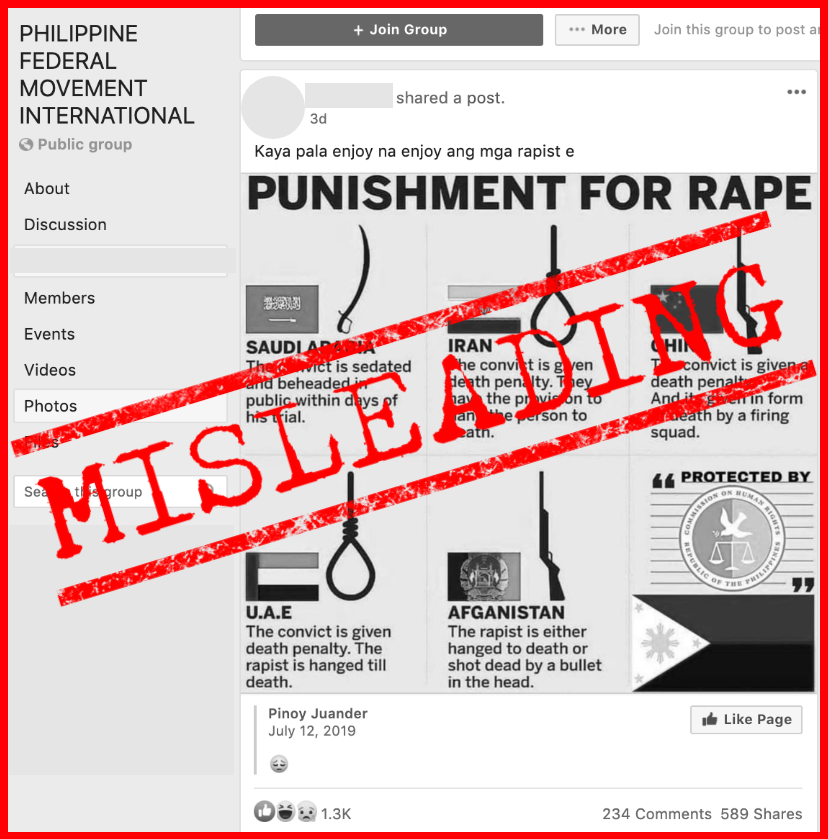Several netizens reshared a misleading 2019 graphic by page Pinoy Juander days after President Rodrigo Duterte reiterated in July his long-standing call to revive the death penalty in the country.
The graphic falsely insinuated that the Philippines, compared with five other countries in Asia and the Middle East, does not penalize the crime of rape; instead its offenders are protected by the state’s Commission on Human Rights.

Rape is classified as a “crime against persons” in the Philippines. Between 1997 and 2006, those convicted of rape were penalized with death, but after the country’s death penalty law was repealed in 2006, the maximum penalty for rape is reclusion perpetua, or imprisonment of 20 years and a day to 40 years.
The Commission on Human Rights does not protect or defend individuals accused or convicted of any crime. As an investigative and recommendatory body, it looks into the human rights angle of cases, and violations “involving civil and political rights,” committed by both state- and non-state actors. (See VERA FILES FACT SHEET: The Commission on Human Rights, explained)
Pinoy Juander’s misleading post had been reshared by netizens to at least five public Facebook (FB) groups since August 1. The claims made about the death penalty for the crime of rape in five other nations, four of them Islamic, need context.
Saudi Arabia
Rape in Saudi Arabia is penalized under the country’s Islamic Law, allowing the punishment of death through public beheading or possibly even stoning. However, its imposition depends heavily on proof presented — a burden that is usually carried by the victim.
The law demands either “a confession from the rapist” or “a witness account from four adult males,” before an offender can be charged with a death sentence. If these requirements are not met, chances are high that the victim will end up being investigated and prosecuted for engaging in sexual intercourse outside her own marriage.
Iran
According to the Cornell Center on the Death Penalty Worldwide, the crime of rape in Iran is punishable by death under the Islamic Penal Code — with hanging as the most common execution method — only if it is a case of “fornication by force” or when the offender is not married to the person raped.
Another offense eligible for a death sentence is the crime of repeated false accusation, or when a person claiming to be a victim of capital sexual offenses is proven to have repeatedly made false accusations. This danger awaits rape victims once they fail to prove the guilt of the offenders.
China
Since 2010, China has stopped employing death by a firing squad in executing criminals, as opposed to the misleading FB post’s claim. Instead, the government uses lethal injection on law offenders charged with death penalty.
Rape crimes are only punishable by death if it resulted in the victim’s demise, if it was a case of multiple rape, public rape, or serious injury, or “if the circumstances are especially serious.”
United Arab Emirates (UAE)
Death by hanging, as stated in Pinoy Juander’s post, is not among UAE ‘s methods of executing criminals, according to the Cornell Center database. Instead, the country employs death by a firing squad as well as stoning — although the latter has not been used in recent executions.
Rape is also punishable by death in this country. However, a 2017 report by legal news website Jurist stated how victims in UAE find it hard to report incidents of rape for fear of retaliation, where victims are tried for adultery instead.
Afghanistan
Zina, or “unlawful sexual intercourse” like fornication or adultery, is sometimes considered a hadd or a fixed crime under the Islamic Law, making it eligible for the death penalty.
However, if available evidence is not enough to prove that the rape is a hadd, the crime could be given a tazir penalty — or a punishment administered by a judge under the Penal Code.
A tazir penalty for “pederasty, aggravated rape or statutory rape” can either be a death sentence or just continued imprisonment.
More, according to the 2017 Equality Now Rape Law Report, Afghanistan — like the Philippines — allows sex offenders to use marriage and the victim’s forgiveness as ways to escape punishment for their rape crime. Like Iran, there are also laws in Afghanistan that impose punishment on women who are not able to prove that they were really raped.
Pinoy Juander’s misleading post already got over 3,500 reactions, 600 comments, and 11,000 shares since it was uploaded last year. Its top traffic generators after it was revived this year are public FB groups PHILIPPINE FEDERAL MOVEMENT INTERNATIONAL, Manang Imee Marcos and FREEDOM WALL.
Pinoy Juander was created in July 2015.
(Editor’s Note: VERA Files has partnered with Facebook to fight the spread of disinformation. Find out more about this partnership and our methodology.)





